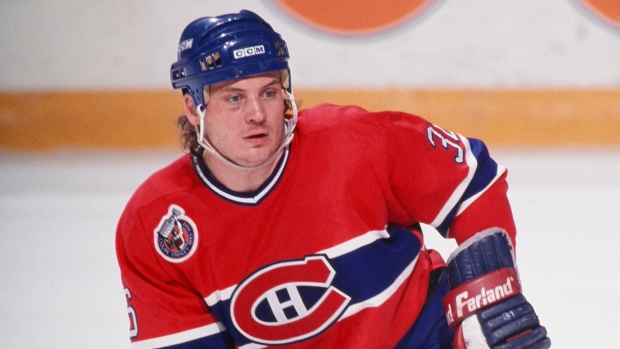Apr 21, 2021
NHL, Todd Ewen’s widow settle wrongful death lawsuit
The National Hockey League has reached a settlement “in principle” in its legal battle with Kelli Ewen, the widow of deceased former NHL player Todd Ewen.

The National Hockey League has reached a settlement “in principle” in its legal battle with Kelli Ewen, the widow of deceased former NHL player Todd Ewen.
Ewen filed a wrongful death claim against the NHL in April 2019, alleging Todd’s suicide in 2015 was linked to the league allegedly downplaying the potential long-term consequences of repeated brain trauma and profiting from a culture of on-ice violence.
A copy of the lawsuit said she was seeking “compensatory damages and all other damages permitted by law.”
Ewen confirmed in a text message to TSN on Tuesday that she had agreed to a settlement but declined to elaborate.
In a document filed March 19 in U.S. federal court in California, a lawyer for the NHL wrote that the parties held mediation on March 7 and “reached an agreement in principle to settle this litigation.”
“Since that time, the parties have been working to memorialize their settlement in a written agreement, the terms of which will be confidential,” NHL lawyer Jack Dicanio wrote in the court filing. “That process is ongoing as the parties ensure that the written agreement satisfies all applicable testamentary and other requirements. The parties expect a final agreement to be signed in short order and anticipate submitting the appropriate documents to the court for dismissal of the case shortly thereafter.”
Dicanio asked that a hearing be convened May 14 to update the court on settlement discussions.
Todd’s case has played a key role in the debate over chronic traumatic encephalopathy (CTE) and concussions in hockey.
Todd fought his way through a dozen NHL seasons, and Ewen says he battled depression, anxiety and memory loss for the last 20 years of his life. He retired from the NHL following the 1996-97 season.
On Sept. 19, 2015, Todd, then 49, killed himself in the basement of his family’s home in St. Louis.
Toronto neuropathologist Dr. Lili-Naz Hazrati declared in February, 2016 that Todd did not have CTE, prompting NHL commissioner Gary Bettman to cite Todd’s case in correspondence with U.S. lawmakers.
Bettman argued that the science over the brain-withering disease was inconclusive and that Todd killed himself because media hype led him to believe he must have the disease.
However, in February 2018, Boston University scientist Dr. Ann McKee announced that Dr. Hazrati had missed detecting it and that she had actually found Stage 2 CTE in Todd’s brain.
While the Toronto researcher said she accepted those findings, the NHL has never retracted its statement about Todd, which set up a potentially high-stakes courtroom battle.
A trial in the wrongful death lawsuit could have occurred as early as this summer. Lawyers had said a trial was expected to feature more than 20 witnesses, including NHL league personnel, Bettman among them.
In the weeks before the settlement, lawyers for Ewen and the NHL had fought over access to the contents of Todd’s iPhone 4 – text messages and data the NHL said might play a key role in Ewen’s lawsuit against the league.
The NHL in August 2019 began to ask Ewen to turn over records related to her claim against the NHL, including documents related to all NHL club alumni events that Todd attended or participated in, documents detailing altercations in which Todd was involved during his NHL career or any other time, including domestic disputes, and documents related to the use of alcohol or legal or illegal drugs by either of the Ewens.
Nearly a year later, in July 2020, the NHL expanded its demand, requesting documents “related to any actual, possible, or contemplated marital infidelity by Kelli Ewen or Todd Ewen” and “all documents related to marriage counselling provided to Kelli and Todd.”
Former NHL players Dan Carcillo and Nick Boynton have outstanding lawsuits against the league over its approach to marketing violence and managing player brain injuries, as does Paul Montador, the father of the late NHL player Steve Montador.

